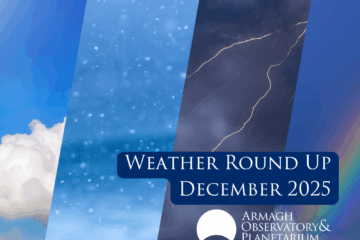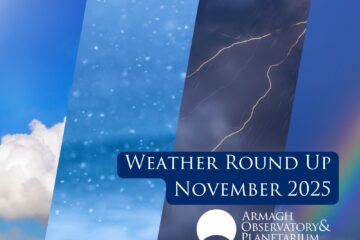DULLEST AUGUST AT ARMAGH FOR 13 YEARS, WARMER AND SLIGHTLY WETTER THAN
AVERAGE. WARMEST SUMMER AT ARMAGH FOR 15 YEARS, DRIEST FOR EIGHT YEARS
AND SLIGHTLY DULLER THAN AVERAGE
Armagh Observatory, 6th September 2021: Armagh Observatory reports that
August 2021 was the dullest August at Armagh for 13 years. Although
warmer and slightly wetter than average, it was also the driest August
at Armagh for three years. Taking the three months June, July, and
August together, the meteorological summer was the warmest at Armagh for
15 years, the driest for eight years and slightly duller than average.
With 100.7 hours of recorded strong sunshine this August was the dullest
at Armagh for 13 years, that is, since the exceptionally dull August
2008 (69.0 hours of strong sunshine). This is approximately 76% of the
140-year long-term (1881-2020) average number of hours of strong
sunshine at Armagh (132.7 hours) and nearly 72% of the most recent
(1991-2020) 30-year average (140.6 hours).
The sunniest days were 11.5 hours on the 28th, 11.4 hours on the 25th
and 9.8 hours on the 24th. Only four other days recorded more than 6
hours of strong sunshine.
The mean monthly temperature was nearly 15.9 degrees Celsius (60.6
Fahrenheit), almost 1.3 C warmer than the 225-year long-term (1796-2020)
average August temperature at Armagh (14.63 C) and 0.4 C warmer than the
most recent (1991-2020) 30-year August average (15.48 C).
Average August temperatures at Armagh have increased markedly over the
last 30 years or so. For example, the (1981-2010) 30-year average was
15.38 C and the (1961-1990) 30-year average was 14.82 C.
The warmest day (highest maximum air temperature) was 25.4 C on the
25th, followed by 24.2 C on the 24th and 23.3 C on the 4th. The coldest
day (lowest maximum air temperature) was 16.1 C on the 16th, followed by
16.4 C on the 17th.
The warmest night (highest minimum air temperature) was 14.7 C on the
11th followed by 14.2 C on the 8th. The coldest night (lowest minimum
air temperature) was 6.7 C on the 2nd, followed by 8.4 C on the 28th.
There was only one ground frost this month, which was -0.3 C on the 2nd.
The observer reported an unusually large flight of approximately 50
feeding swallows above the weather station on the morning of the 15th,
and on the 18th two ravens harrying a buzzard.
Total August precipitation was 90.00 mm (3.54 inches) including six
trace values, that is, 89.7 mm if trace values are ignored. This is
9.3% more than the 183-year long-term (1838-2020) average August
precipitation at Armagh (82.35 mm) and 14.5% more than the most recent
(1991-2020) 30-year August average (78.62 mm). Owing to a very wet spell
between the 5th and the 7th, this August was slightly wetter than
average, but it was still the driest August at Armagh for three years,
that is, since August 2018 (78.85 mm).
The wettest day was 20.6 mm (0.81 inches) on the 6th. This was preceded
by 19.7 mm on the 5th and followed by 15.1 mm on the 7th. These three
days provided nearly 62% of the whole month’s precipitation. The only
other day with significant rainfall was the 21st, with 11.3 mm.
Thunder was heard during the early afternoon of the 9th.
Apart from a few days beginning on the 5th of August, the month was
dominated by high atmospheric pressure. This culminated on the 31st in
what was an exceptionally high atmospheric pressure for August,
approximately 1035 mbar (reduced to mean sea level). This was equal or
close to several other nearly equal extreme August atmospheric pressures
in the Observatory’s calibrated 170-year record of daily pressure
readings extending back to 1850.
The three months June, July, and August together comprise the
meteorological summer. This summer was the warmest at Armagh for 15
years, the driest for eight years and slightly duller than average.
The mean summer temperature was 16.19 C, which is approximately 1.87 C
warmer than the 225-year long-term (1796-2020) average summer
temperature at Armagh (14.32 C) and approximately 1.10 C warmer than the
most recent (1991-2020) 30-year summer average (15.10 C). This was the
warmest summer at Armagh for 15 years, that is, since summer 2006 (16.30
C), and only slightly cooler than the summer of 1983 (mean temperature
16.23 C). In round figures the warmest summers at Armagh are now 1995
(16.5 C); 2006 (16.3 C); 1983, 2021, 2018, 1826 and 2013 (all
approximately 16.2 C); 1976 (16.1 C); and 1846 (16.0 C).
Total summer precipitation was 157.85 mm (6.21 inches) including 11
trace values, that is, 157.30 mm if trace values are ignored. This is
only 72% of the 183-year long-term (1838-2020) average summer
precipitation at Armagh (219.44 mm) and 75% of the most recent
(1991-2020) 30-year average (210.55 mm). This was the driest summer at
Armagh for eight years, that is, since summer 2013 (146.25 mm).
There were 413.0 hours of strong sunshine during summer 2021, which is
approximately 97% of the 140-year long-term (1881-2020) summer average
(427.0 hours) and 98% of the most recent (1991-2020) 30-year average
(420.0 hours). Summer 2021 was much sunnier than the very dull summer
of 2020 (294.1 hours), but slightly less sunny than the summers of 2019
(435.2 hours) and 2018 (478.2 hours).
FOR FURTHER INFORMATION PLEASE CONTACT: Mark Bailey at the Armagh
Observatory, College Hill, Armagh, BT61 9DG. Tel.: 028-3752-2928; FAX:
028-3752-7174; mark.bailey@armagh.ac.uk; URL:
These data refer to observations at Armagh Observatory, which has
been recording the weather at Armagh since 1795.
For further information, please contact:
Professor Mark E. Bailey
Emeritus Director of Armagh Observatory
Armagh Observatory and Planetarium
College Hill
Armagh
BT61 9DG
Tel: 028-3752-2928
E-mail: mark.bailey@armagh.ac.uk



0 Comments